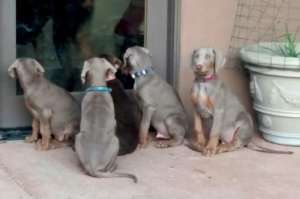Training
Early socializing is important, as Dobermans can become somewhat sharp without it. A rule of thumb is that puppies should meet and greet approximately 100 new people and dogs by the time they are 10 months old. Puppy playschools or obedience classes designed for puppies where socializing with people and dogs is emphasized is an important part of bringing up your new Doberman, no matter his or her age.
 Dobermans enjoy such sports as agility, obedience, tracking, search and rescue, and some even excel in herding. Training a Doberman involves a light touch, as they rarely respond to negative or heavy-handed treatment. A Doberman can’t be drilled in the same way that a border collie can be given a task to do over and over and over. A Doberman will shut down after about the third repetition, figuring if you haven’t got it by now you never will, so let’s move on to something else.
Dobermans enjoy such sports as agility, obedience, tracking, search and rescue, and some even excel in herding. Training a Doberman involves a light touch, as they rarely respond to negative or heavy-handed treatment. A Doberman can’t be drilled in the same way that a border collie can be given a task to do over and over and over. A Doberman will shut down after about the third repetition, figuring if you haven’t got it by now you never will, so let’s move on to something else.
Behavioral and training issues are common with all breeds. There are many types of trainers ranging from Certified Pet Dog Trainers to board-certified Veterinary Behaviorists, a specialty within veterinary medicine. The board members of Doberman Rescue of New Mexico have some practical knowledge with normal issues but are not professional trainers; our group has on occasion had valuable help from certified dog behavior consultant Dani Weinberg, Ph.D., owner of Dogs & Their People. She and other good trainers are listed for your reference.
Albuquerque Area
Dani Weinberg, Ph.D.
Website: Dani’s Dog page
Email: daniw3@comcast.net
Phone: 505-898-7568
Sonya Burr
Website: Triple Quest Kennels
Email: sonya@triplequestkennels.com
Phone: 505-980-4480 (cell); 505-916-0952 (kennel)
Julie Hart
Website: Hart to Heart Canine Training, LLC
Email: julie@hart2heartcanine.com
Phone: 703-254-6582
